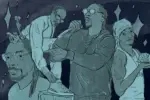Pat Conroy’s works like “The Great Santini” provide readers insight into the Southern author’s life and childhood.
The most abundant sources of information and inspiration authors have at their disposal are their own life stories. Creative nonfiction gives authors access to a plethora of real people with complex stories, goals, looks and actions. These aspects of another person’s life can be adapted by authors into fictional characters who look and act realistically. The most developed characters go on to become literary icons that readers either admire with fascination or curiously abhor. That is the case for Pat Conroy’s third novel, “The Great Santini”, and many of his other works.
Pat Conroy was born on October 26, 1945, in Atlanta, Georgia; the first of seven children, Pat was raised as a “military brat” by his father, Donald Conroy, as a Colonel in the Marine Corps. Due to his father’s constant relocation to different Marine Corps forts, Pat Conroy had attended eleven schools by the time he reached age 15. It wasn’t until his family eventually settled in Beaufort, South Carolina, did Conroy complete his high school education and enroll as an English major at The Citadel, a military college.
One of Conroy’s major contributing factors as a writer – according to him – came from the physical and psychological abuse he suffered at the hands of his father.
In the same interview, Conroy went on to say, “an unhappy childhood is the greatest gift a writer can receive.”
Throughout his life, Conroy married three times and had a total of six children, four of whom he adopted through marriage. Conroy’s experiences with child abuse, school life, sports and other difficulties became the inspiration for the twelve books he wrote throughout his life. Some of these books include “The Water is Wide”, “The Lords of Discipline”, “The Prince of Tides” and his most personal book, “The Great Santini”.
The novel, set in 1962, follows Lt. Col. Wilbur “Bull” Meecham as he’s just relocated his family to Ravenel, South Carolina, a family which he has total command over. Bull is a soldier without a war who treats his family like a squadron of Marines, hoping they will continue the tradition of creating great soldiers such as himself. The brunt of Bull’s pressure is placed upon Ben, his eldest son, who plays basketball in high school. Although just as respectful as he is fearful of his father, Ben wants to be more than just a soldier; he wants to be everything his father isn’t.
The most obvious real-life inspiration is Bull’s position as a Colonel in the Marine Corps, which is similar to Donald Conroy’s. Another is Ben’s choice of sport being basketball, which is what Pat Conroy played during his tenure at The Citadel. Bull’s controlling relationship with his son is most evident during scenes involving either Ben or both characters playing basketball, which makes sense given the competitive nature of the game and Bull’s need to dominate his opponents.
During one scene, Bull and Ben are playing a one-on-one basketball game in their backyard while the rest of the family watches them. Initially starting with the two lightly trash-talking each other, the game takes a serious turn once Ben is one point away from winning the game This could make him the first member of the family to beat Bull at any competitive activity. Once Ben does beat his father, Bull decides to change the rules, making it so that he has to win by two points instead of one. Ben refuses to continue the game, which only leads to Bull verbally assaulting him by saying he’s afraid and a “mama’s boy”, bouncing the ball off Ben’s head while Ben walks back to his room. The bouncing doesn’t stop until Ben finally reaches his room and slams the door in his father’s face. This type of upbringing and storytelling doesn’t just reveal how Pat Conroy’s experience as a “military brat” but also resonates with readers who have had a similar experience.
There are plenty of reviews on Goodreads expressing how the novel reminded them of their experiences with military life. One review comes from user Kim Kaso, a veteran who served with the Navy and Marines and raised “military brats” of herself. “Many military men are not good sports,” she said, “competition is life or death to them. Many people wonder if Conroy exaggerated. Maybe. But I doubt he needed to resort to much hyperbole, there are plenty of outrageous egos and stories that are authentic. I found myself in uncomfortably familiar territory, brought back so many memories. Serving as a female officer was no walk in the park, either.” Reviews such as Kaso’s show Pat Conroy not only created a novel that resonated with his life story but also with those of readers who’ve had similar experiences.
Pat Conroy’s “The Great Santini” acts as a bridge between worlds, fictional and real. Scenes such as the basketball game give the audience a peek into the terrors possibly haunting their friends, coworkers and even family. These may be terrors a person has grown out of or may still be dealing with, physically or mentally. By being informed of such hardships and their effects, audiences may become better at communicating with, and helping, those who need healing. For the readers who have experienced such a trauma, Conroy’s work assures these readers that they are not alone and that their situation will change one day. The novel also shows them how to survive when growing up in such a difficult situation.

















